9. White Hunter Black Heart
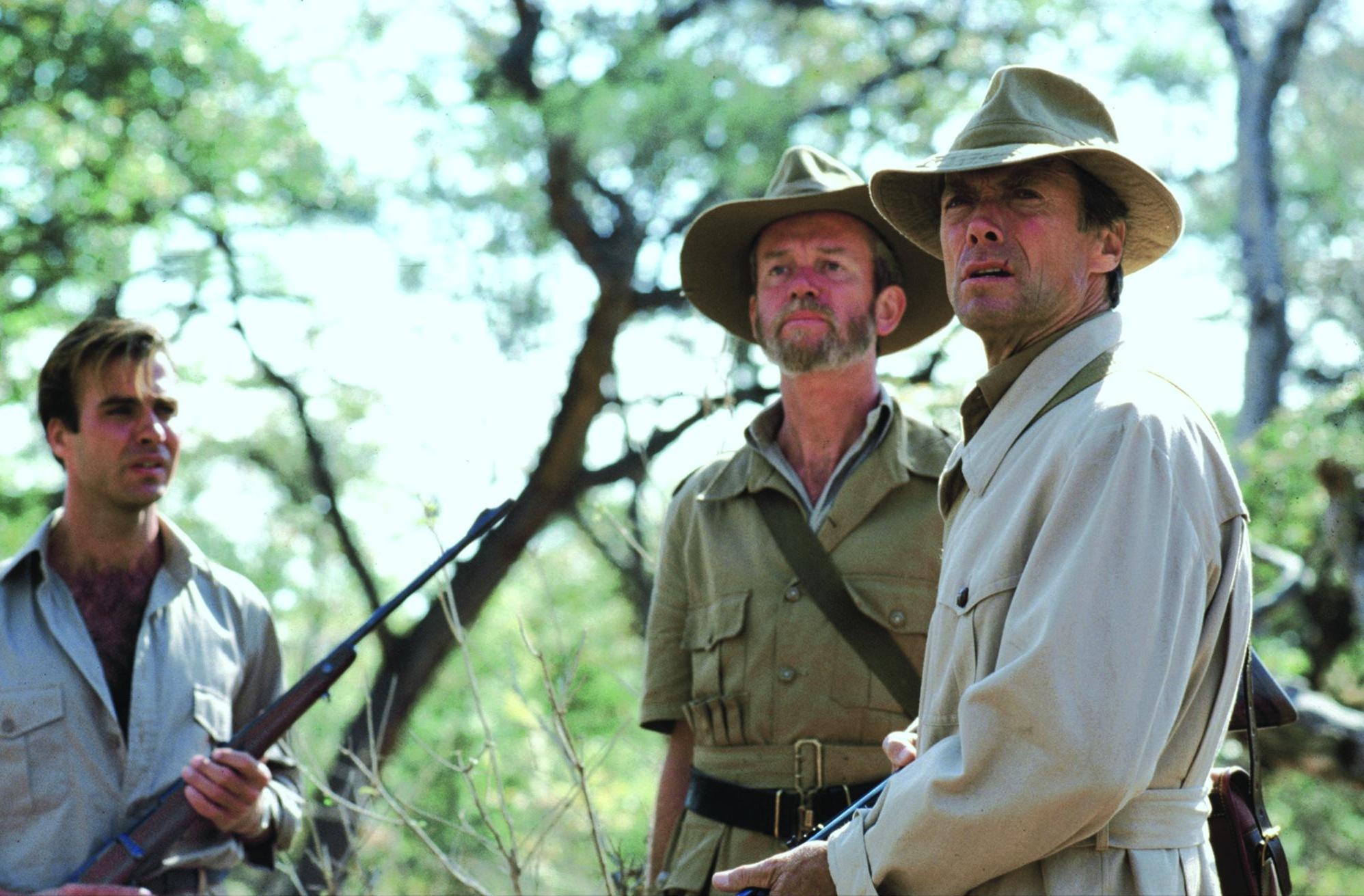
What urges a man to hunt down beautiful animals, to stuff the creature and mount it on his wall, even looking at them years later with pride, reminiscing the moment when he delivered the fatal blow? As an animal lover myself, I’m quite disgusted by it. There are exceptions to some forms of hunting, when it comes to survival or perhaps for the harmonization of the ecosystem. But then there are the men of means who travel to exotic countries, murder endangered species, and pose themselves next to the carcass, beaming a proud smile.
It’s easy to consider them villains. Wishing that they themselves could be hunted down by the beautiful animals they murdered. But looking at history, you realize that many great men were hunters too. Hunting was, and still is in some circles, considered a natural masculine activity. Not only that, it was considered a great sport, and there was even talk about the spiritual bond a hunter can have with his prey.
One such man who believed in the greatness of hunting was director John Huston. A man who practically made one of his famous films, “The African Queen,” just so he could travel to Africa and hunt down an elephant. The story of “White Hunter Black Heart” is similar to one of Ernest Hemingway’s most famous books, “The Old Man and the Sea.” Like Hemingway’s old man, Huston comes to respect his target, in this case being a beautiful elephant. Unlike the old man, however, his realization comes too late and comes with a tragic cost.
Technically, this film is an adaptation of a novel by Peter Viertel about a script doctor who accompanies his friend and director, John Wilson, to Africa in preparation for a movie. But the novel is actually a memoir of Viertel’s experiences with Huston during the making of “The African Queen.” It’s an honest but certainly not flattering portrait of the real man, though when Huston read it himself, he claimed to have enjoyed it and just like his earnest nature, made no attempts to stop it from being published.
Eastwood plays the man himself, and though he does not entirely manage to do away with his classic mannerisms, this is the transformative performance of his career. Eastwood mimics Huston’s genteel and sophisticated voice while brimming a slightly intoxicated smile throughout, just like the real Huston who was a notoriously heavy drinker.
The script was co-written by the real Viertel and therefore stays close to the source material. Jeff Fahey plays Viertel and though the actor himself has been known to star in one or two B-movies, this film reminds you that he is capable of so much more.
You believe the friendship these two men have, and you understand why Huston enjoyed his company. Like Huston, he doesn’t mind calling people out on their bullshit and is one of the few people who can keep up with Huston’s drinking and boisterous behavior.
The film also doesn’t glamorize the so-called Golden Age of Hollywood. People are appropriately prejudiced and the art of film is nothing more than business, just as it is now. Huston himself is prejudiced but loathed small-minded bigotry, and this is evident in the scene where he hilariously ridicules a British socialite after she makes anti-Semitic statements in front of Viertel, who happens to be Jewish.
It also brilliantly mocks British colonialism, as Huston grins with awareness when a British socialite is telling him that they would never lynch a black person because they aren’t savages like the Americans. Huston even provokes a fight with the hotel manager after he ruthlessly pushes down a black waiter and makes racist remarks – and sadly for Huston, he loses this fight. This fight also makes Huston reveal his philosophy of life and the reason for his many conflicts: ”You gotta fight when you think it’s the right thing to do. Otherwise, you feel like your gut’s full of puss. Even if you get the hell beat outta ya, if ya fight, ya feel okay about it.”
This a filmmaker who didn’t care about his audience, who wanted to make honest pictures whether or not they would make money. It portrays a man who wanted the dangerous and exciting life and sought movie productions in which he could exercise this need. He wanted the power of the establishment but wanted to live outside it. A man irresponsible with money and liked ridiculing the shallowness of the upper class, despite being one of them. A man who obviously drank too much, whored around and who could either be your enemy or your best friend.
This is one of Eastwood’s most underrated films, often forgotten when his great legacy of films gets discussed. As per usual, Eastwood is adept at portraying real-life figures, never afraid of showing their dark side. This was a man with a beautiful kind of madness who would, as a character of this film appropriately states, have been in the madhouse if he hadn’t found success in the film industry. This madness would eventually cause tragedy: the life of a person who saved his life. Our awakenings often come too late and the price is often paid with suffering and in this case, the life of another.
Even so, seeing this story portrayed on screen was a pleasure from beginning to end.
8. Heartbreak Ridge
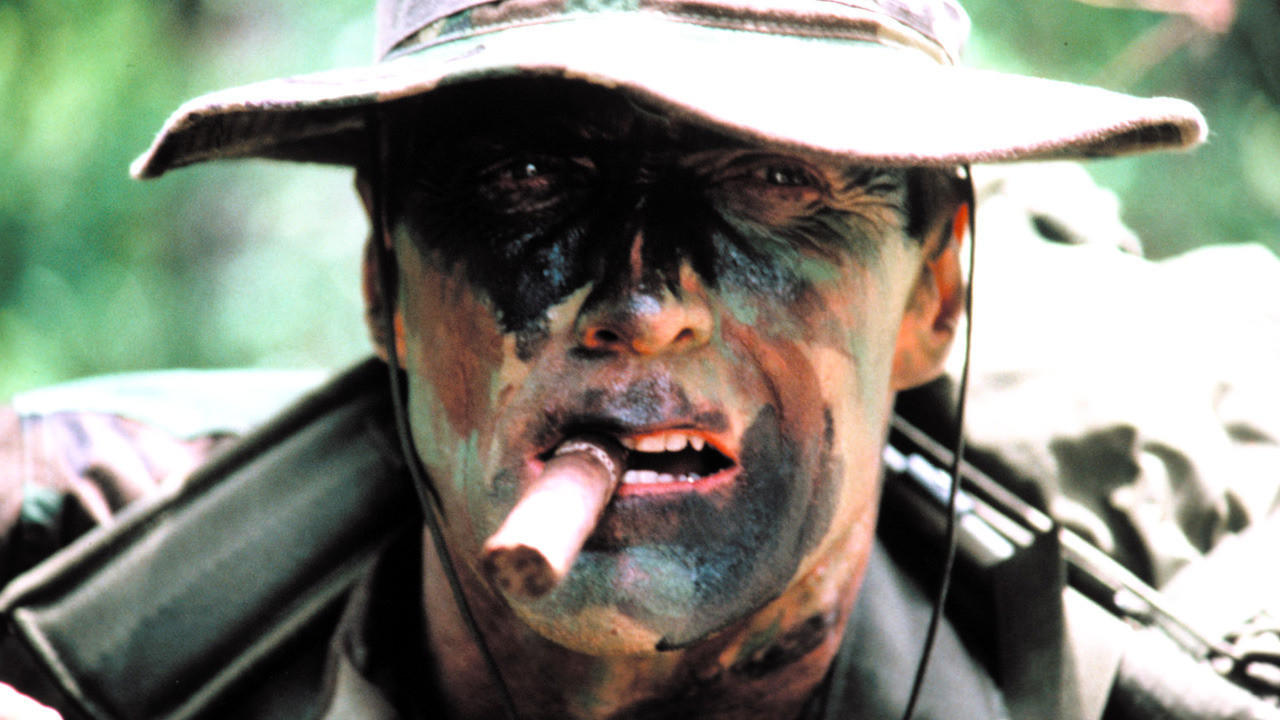
This is a war movie far removed from the tragedies portrayed from Eastwood’s later masterpieces, “Flags of Our Fathers” and its companion piece “Letters from Iwo Jima.” You don’t get a sense that war is hell by the end of this film. Sure, there is some peril at the end, but it seems like a lot of fun too, especially if you can listen all day to the witticisms of Gunnery Sergeant Thomas Highway.
It seems like the type of movie the Army would love to endorse and they were planning to do so, but they quickly dropped out. The film wasn’t clean-cut enough. The filmmakers then changed Thomas Highway into a Marine instead of a GI, hoping the Marine Corps would endorse them instead.
Sadly they would denounce the film as well after seeing a rough cut, purely because of the foul language (because we all know all Marines are goody Christians who talk respectful of women and refrain from profanity). They also took offense with Highway receiving scorn from a commanding officer, especially since he was a Medal of Honor recipient. We all know there is no such thing as rivalry between commanding officers. All Army men are good, clean killing machines who do as they are told and are not sensitive to that pesky little thing called human nature.
Hearing this, it might sound like the marketing department of both the Army and the Marine Corps were a bunch of pansies and they certainly were. If there’s any film that could make someone consider enlisting, it’s this film. It’s the ultimate celebration of Marine Corps camaraderie and the profanity of its lead players are a necessary ingredient.
In the film we have a bunch of ragtag, undisciplined heathens who are shaped into real men under the harsh but necessary training of Gunnery Thomas Highway (a role built for Eastwood). Nobody could get this platoon in shape, but Highway isn’t fazed. When he enters their military housing and finds the men lounging about, playing pool, listening to that damn rock ‘n roll music, he grabs the radios and smashes them to pieces. Before the men could even protest, Highway makes clear that he’s ”drank more beer, banged more quiff, pissed more blood and stomped more ass” than all them put together. Party time’s over. It’s time you guys become proper Marines.
Naturally these fools try to upstage the awesome manliness of Highway. One of their attempts includes a huge body-building Swede, who tells Highway that he’s going to rip of his head and shit down his neck, but all that muscle mass isn’t going to be enough to take down Highway, who quickly dominates the big guy into submission and then makes him join the Marines – which will come handy later when they need him to lift an M60.
This is a different world than the psychological torture that was Army training in Stanley Kubrick’s “Full Metal Jacket.” That film was a condemnation of what such training does to individual minds, while “Heartbreak Ridge” harps back to a simpler time, where Army/Marine training doesn’t damage you, it shapes you into a man.
If this movie would be made now, it would be called irresponsible. Right now films are being shamed for being considered too lighthearted on certain issues. You have to take things seriously now, you have to be responsible. It used to be that Republicans would mope about the irresponsible content of a film, and now it’s liberals chastising the filmmakers for not being liberal enough. But movies aren’t necessarily there to tell a message. Sometimes it is, but sometimes it’s just there to entertain or to portray a world, a world that might be very alien to your biases. You don’t complain about “Goodfellas” being too politically incorrect; it’s portraying the world of scumbag mobsters.
But it would also be unfair to say that “Heartbreak Ridge” is meant to be realistic, even if some Marine Corps authorities have vouched for its authenticity, that the film is meant to be realistic. It’s meant to be entertaining and this film succeeds this on all fronts, from the crackling dialog you will quote till the end of your days to the colorful supporting cast and the abundance of humor. In fact, one could easily call this a war comedy.
Not to mention that the character of Gunnery Sergeant Thomas Highway is one of the finest and memorable drill instructors of cinema, up there with R. Lee Ermey and Louis Gossett Jr. It might not be Eastwood’s most profound film, but it might be his most entertaining one.
7. Changeling
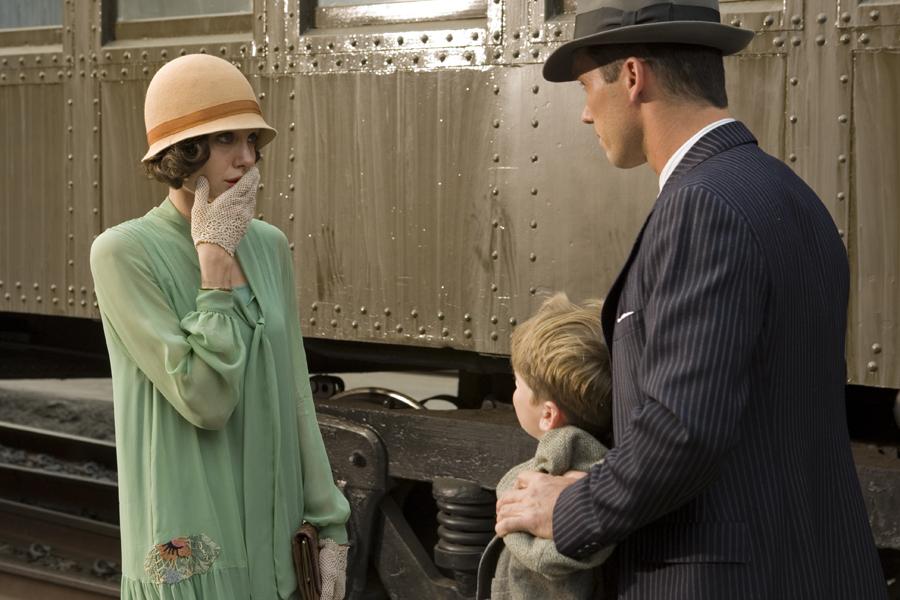
Looking at Eastwood’s massive filmography, it’s fair to assume that the stories generally are centered around a male character. It’s basically one giant sausage fest. Now, there’s nothing wrong with that – even though surely some people might think there is – but it’s nice to see an Eastwood film starring a strong female character. Not only that, for a man known for his masochism and less than politically correct attitudes, the film tackles even the disempowerment of women.
Based on a horrific true story, which is weaved in a splendid script by J. Michael Straczynski that though not entirely historically accurate, manages to still be faithful and respectable to the real life events. It’s set in 1928, where a single woman, Christine Collins (Angelina Jolie in probably the greatest performance of her career), discovers that her son is missing. Through the help of a zealous and progressive priest, Reverent Briegleb (John Malkovich), pressure is being sent to local law enforcement, who are desperate to avoid a scandal and another public humiliation by the press.
After some time, they announce that they found the boy alive; however, when they bring him to her, she realizes that he’s not really her son, but the authorities assure her that he is. It becomes rather clear to her that they planted the boy just to silence her. When she starts to challenge their narrative and even starts to talk to the press, she is put into a mental asylum, where they lock her up, telling her that she can leave if she admits that this new boy is her real son. Like a true mother, with infinite love for her child, she refuses.
“Changeling” is a definitive feminist film starring a realistic female main character – not a Mary Sue type which has become popular these days – who must overcome the obstacles of a sexist society, which uses both the press and the justice system to silence her as she tries to find out the whereabouts (and possible fate) of her missing child. This is in a time and place where there were giant social barriers against women, where women had to know their place. A time where if women would become too ‘hysterical’ they would be placed into a mental asylum, where they could be treated poorly and sometimes even suffer horrific practices like a lobotomy.
Even with the dark subject matter, Eastwood has created riveting thriller, which, if you don’t know the real-life story, is filled with twists and turns that keep you glued to the screen. Eastwood keeps you constantly engaged. Like many of his films, the time period is wonderfully recreated. Eastwood differs himself from other directors in that he’s both a visual and acting director. But the beautiful thing is that his visual style is never obnoxious and never detracts from the central narrative. There’s also the haunting score composed by Eastwood himself, which is quite effective, especially in the film’s more horrific moments.
“Changeling” is an incredible film from a director who, despite his age, just keeps hitting home runs. This could have been the best movie he’s made in the years until now, were it not for “Gran Torino.”
6. Bird

The first 10 minutes of the film contains drug-induced intoxication, depression, grief over a dead child and a suicide attempt. It doesn’t take any prisoners; it puts you right into the home of Charlie Parker (Forest Whitaker), where we receive an intimate glimpse of the damaged souls that live there. We see Charlie swagger in a drunken stupor, mumbling to his tired wife, Chan Parker (Diane Venora), wearing large boxers, showing just a little too much crack. We see the fear in Chan’s eyes when Charlie wants to tend to his crying infant, hitting Charlie to stop him from touching him, as she fears losing another child. Before Charlie attempts to take his life, he looks into the mirror, taking a good look at himself as he sheds a single tear. When his wife finds him nearly dying from swallowing iodine, she doesn’t panic, rather sighs in annoyance and says: ”That was stupidity. Now I have to call an ambulance.”
From the get-go, you know it’s not going to be easy watching. This film would become the first Clint Eastwood movie to receive Oscar gold, as well as a Golden Globe for best director. It would be the first of his series of biopics and it would also be his greatest one. It’s hard to say what makes this the greatest one, as it naturally depends on what topic you prefer. What makes Eastwood’s biopics great is that they all differ from subject and individual; he started with Charlie Parker, moved to John Huston, then to J. Edgar Hoover, and finally (and most controversially) Chris Kyle.
All of these are very different people and if there’s any connecting thread between them, it’s the incredible loneliness they felt when they stopped acting like their public personas. We can see this in Huston, Hoover, Kyle and certainly Charlie Parker. Eastwood’s “J. Edgar” fell a little flat because of how massive the subject was; his biopic on Chris Kyle is sadly filled with the bluster of the man himself; “White Heart Black Heart” is his second greatest biopic, but despite Eastwood’s great turn as Huston, it doesn’t hit the heartbreaking dramatic notes of “Bird,” mostly due to Forest Whitaker’s soulful performance as Parker.
Perhaps it’s because Parker is more likable. We can love the art but we must never underestimate the tragically flawed nature of the artist, which in these days becomes far more apparent. The greatest enemy of Huston was his delusional masculinity, which led to deep alienation and the tragic death of an innocent person. Parker’s greatest enemy was his beatnik lifestyle and a drug addiction he would carry until his death. Huston’s weakness was his denial of it, whereas Parker’s weakness was his resignation to it.
Perhaps it’s Whitaker’s sad eyes that make this performance so moving. When he smiles, his eyes beam like an innocent child; when he cries, the slight droopiness of his left eye makes him seem even more vulnerable. There’s a genuineness and openness to his character, there’s rawness and honesty in his music. When he’s playing the sax, we can sweat pouring from his face. He’s willing to give everything for his music, his great passion. But when the music stops, that’s when the real battle begins. If there’s anything to learn from troubled artists it’s that it doesn’t matter how good you are at something, you just can’t escape yourself.
The film has a scattershot narrative on the life of Charlie ”Bird” Parker, moving to the past and the present constantly, but it all flows perfectly. There’s a great romance with Chen Parker, a romance that is both destructive and pure. These people are victims of the great beatnik dream. And like any dream, there awaits a rude awakening. This is the sad truth of all the disillusioned hipsters and hippies that would come to pass. It’s the yearning for a freedom they cannot handle, it’s their love for each other that should be enough, but never is.
Perhaps if they hadn’t lost a child, things would gone differently. Perhaps Charlie would have found a reason to clean up his act, but it seems unlikely. As we see from this film, the seeds of his self-destruction were already there. The film never indicates whether he needed this drug-induced lifestyle to create his music, which is the everlasting question concerning these men. Faulkner always stated that his alcoholism was a deterrent rather a necessity for his art. We don’t know if this includes Parker too; would his music have sounded so sweet if he had been more sober throughout the course of his life? Eastwood rightfully never answers this.
“Bird” is a beautiful accomplished biopic, both a tribute and an honest portrayal of this great artist. The swath of musical biopics that would come after could never come close to the earnestness of Eastwood’s “Bird.” And even if you don’t like the genre, you can always stay for the music.
5. Gran Torino
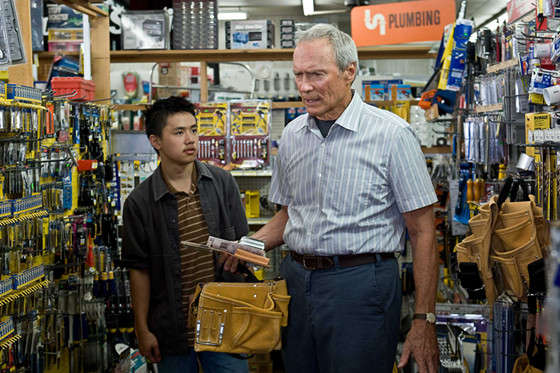
Clint Eastwood looks really old in “Gran Torino.” This shouldn’t come as a surprise to anyone, seeing as he started his prolific career in the early 1950s. We have to go back generations before you will meet people who remember Eastwood as the fresh-faced young man from “Rawhide.” The generation of now will say that he looks an ”awful lot like that Scott Eastwood fella.”
Eastwood has played up his gray hair since the 1980s, realizing that playing a grumpy old-timer was something that suited him exceedingly well. His characters are often battle-scarred; they’ve seen a lot in their lives, perhaps a little too much. There’s the uncomfortable truth of the needless death, through fate or ignorance of man. The brutality of the world, the fragility of life. The facts have hardened them but haven’t destroyed them.
That face is still there, but time has not left it unscathed. There’s something different now. As an actor, he always had the benefit of expressive wrinkles, but these new ones have gotten rid of any smoothness that was left. The receding hair has made his eyes look even beadier. The face looks the same in the shadows but when it appears into the light, there’s no denying it. Eastwood is really old now and he isn’t going to last forever. There’s death in his face. It’s coming, and he knows it.
This is why his role as Walt Kowalski is so incredibly powerful. It wouldn’t be the last time we would see him on screen but for many, including me, it surely felt that way.
Kowalski is a Korean War veteran who spends most of his days drinking beer on his porch and judging his Asian neighbors, using a series of racial epithets. The recent loss of his wife has made him increasingly bitter. He’s angry at how the neighborhood is changing, he’s angry at his son for trying to put him in an old folks home, he’s angry at God for taking away the love of his life.
Not only must he deal with his grief, he must also deal with the painful memories of all the horrific things he had to do in the Korean War. When a neighborhood boy, Thao Vang Lor (Bee Vang), is pressured by a local gang to steal Kowalski’s precious Gran Torino car and fails to do so, he receives a vicious beat on Kowalski’s front lawn. Kowalski comes to his rescue, pointing a rifle at the gang and scaring them away.
This act makes him beloved by his neighbors, who decorate his front porch with daily free food as a token of their appreciation. As for the precepts of his Hmong heritage, Thao must work for Kowalski to earn his redemption. The two start to form a warm friendship and Kowalski begins to teach Thao in how to become a man. As Kowalski also becomes close to Thao’s family and the community, he increasingly comes to their aid, antagonizing the local gang. Walt soon begins to concoct a definitive solution to the problem…
The ending involves gunplay but subverts it in a highly satisfying manner. “Gran Torino” is simply a perfect Eastwood film. It’s a story that could have easily been sappy but Eastwood keeps it levelheaded, thanks to the abundance of humor. He would later star in the excellent “Trouble with the Curve” and make an uncredited appearance in “American Sniper.” He’s still going strong behind the scenes and he hope this continues for a long time.
Despite this, to me, this is the swan song to the bad-ass persona that made him famous. This is the way Dirty Harry and his many other badass characters would have liked to say goodbye.
4. Flags of Our Fathers
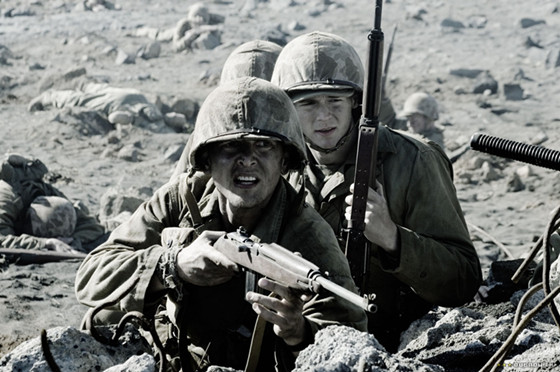
The question of true patriotism has been a controversial subject as of late. As with the frustrating flexibility of religion, notions of patriotism can be defined in a multitude of ways, and neither party nor political ideology have true authority over its gestures.
This is why some find Snowden a patriot, others a traitor. This is why some are outraged by football players kneeling during the national anthem and others find this brave. This sense of duty has been indoctrinated into the minds of Americans from early on, mythologizing the origins of its country, often to ridiculous portions; the history of America either becomes a symbol for progressive values to the Left while it becomes a symbol of Christian values to the Right.
One believes it was founded on principle of equal rights, the other on Jesus. Both sides make up their version of its history. Never mind the fact that the leaders of America owned slaves, never mind the fact that they wanted to separate Church and State.
In the end, true patriotism is a sense of ideals that transcend governmental order or any authority for that matter. In cinema, the heroes of such stories question authorities and eventually defy them all for this idea of America, perhaps not what it is but what it should be. We see this being exploited countless times in American cinema. Americans love the troops so it’s excellent fodder for Oscar bait.
But sometimes, filmmakers manage to do something special: they manage to imbue that sense of patriotism without sentimental pandering, asking harsh questions yet honoring this patriotic dream, whether or not it even exists. Perhaps there are no better examples of this than Clint Eastwood’s “Flags of Our Fathers” and its companion piece “Letters to Iwo Jima.”
In “Flags,” we explore the men behind the famous picture where American troops raise the flag on Iwo Jima. The Army sees an opportunity to exploit this picture to imbue patriotic sentiment into the country, but there’s a psychological toll on these men when they return to their countries. These men don’t feel like they deserve to be heroes and when their celebrity fades, the lives of these men end in tragedy.
We mythologize our troops but they are merely human. We think they are fighting for our freedom but when they get there, they realize it’s far more complicated than than that. And we forget that those who survive the war may never live again.
It’s tender film yet it takes no prisoners. It’s not a happy story but it’s a story that deserved to be told. Perhaps “Iwo Jima” is the superior film with its unforgettable gut-wrenching scenes, but “Flags of Our Fathers” deserves to be remembered as one of the greatest and most honest war films.
3. Letters to Iwo Jima
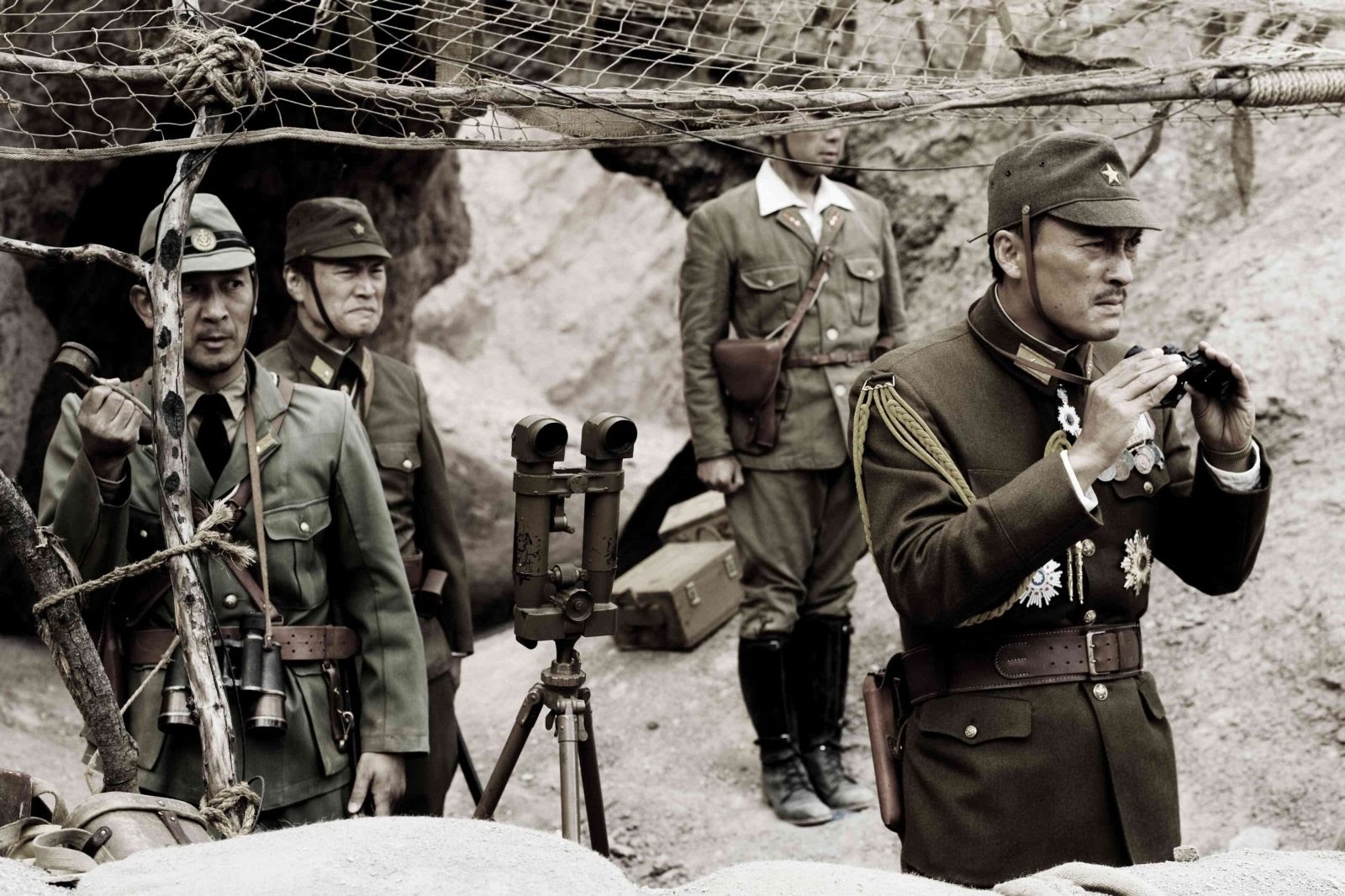
In “Letters to Iwo Jima,” we view the battle of Iwo Jima from the Japanese perspective, where we see young men who aren’t that different than young men they are fighting. Like the Americans, they pretend to be hard, tough men but at the end of the day, they are just boys trying to survive. Perhaps in the beginning they were excited to kill for their country, but now they just want to go home and sleep in a warm bed. The difference with this perspective is that we know they are going to lose and the commanding officers, led by Kuribayashi (a wonderfully gentle performance by Ken Watanabe), begins to realize this when he examines the conditions at Iwo Jima.
Like the Americans, the Japanese were indoctrinated to love their country, but the difference is that the Japanese kind of a patriotism has cult-like proportions. The Emperor is not just the leader of their country – his authority is godlike. The sense of honor must be upheld by all means necessary, as shame is worse than death. To escape or be captured is not an option. There is a death pact that comes with enlisting into the army.
When a commanding officers tells his young troops what to do, you see understanding yet doubt in the eyes of the young men. They didn’t expect this to happen; they were promised a swift victory and now suddenly, they must die for their country. When we think of Kamikaze, we often think of the Japanese fighter pilots who, at the end of the war, aided with a dose of amphetamines to amp them up, flew right into the enemy’s ships, blowing themselves and the enemy up in the process. But until this film, most of us didn’t think of young men blowing themselves in the garrisons, often to tears.
This film is imbued with respect for both the history and culture of Japan, but never romanticizing the culture like so many Hollywood films tend to do. Both the troops in “Flags” and “Letters” are the same – young men put into insane situations, trying to honor the ideals of their country.
People often mention “American Sniper” as being indicative of Clint Eastwood’s political views. Being one of the few outspoken right-wing filmmakers of Hollywood, his films are often perceived through a political lens. His rather embarrassing endorsement of Mitt Romney – in which he had an imaginary conversation with Obama during the 2012 Republican National Convention – and his statement that people should just ”get over” Donald Trump’s crude and racist remarks, makes him an easy target for liberals and social justice warriors.
But people always seem to forget that he’s the one that made World War II movies from both the American and Japanese side. This noble endeavor gave us two of the best war movies ever made, both transcending any conventional political bias. In truth, his films aren’t really that political to begin with; they speak rather of values which can be considered old-fashioned but are universal in nature.
In this film, we see what patriotism really looks like: we don’t see dying soldiers weeping with pride as they whelp about the honor of dying for their country. Here we see the madness, the struggles from within, and that comes from this idea of patriotism. It be might a wonderful idea for many, but for those who who live it, the experience can be horrifying.
2. Million Dollar Baby
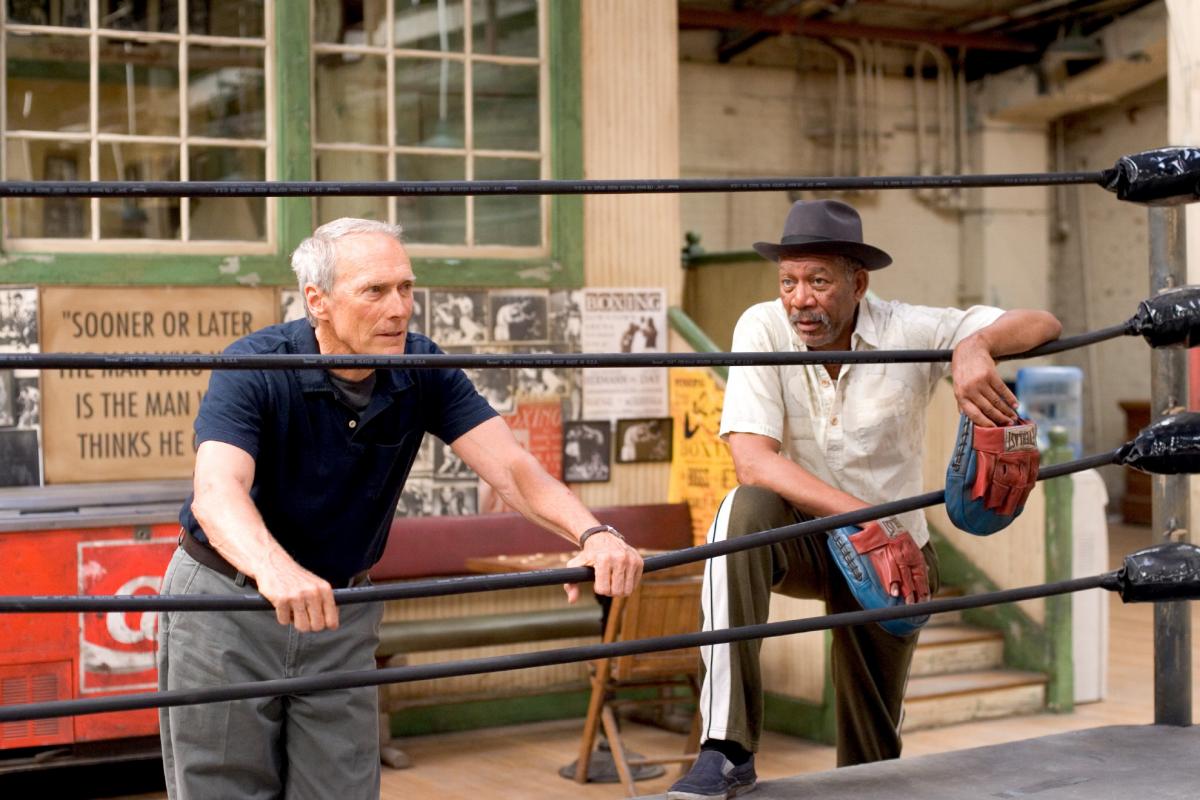
There’s an authenticity to how Eddie ”Scrap-Iron” Dupris (Morgan Freeman), the narrator of “Million Dollar Baby,” speaks about the art of boxing, and physical and emotional torment that comes with it. That’s because many of his words come directly from F.X. Toole, the author of the original short-story collection “Rope Burns,” on which this film is based. Toole was a boxing trainer himself and understood more than anyone the psychology of the fighter.
The unnaturalness of moving into a fight instead of turning away from it. The madness that’s necessary to willingly get inside the ring and receive a vicious beating and then do it all over again. There is nothing pretty about the sport and the consequences can be devastating, as one can see from this film.
Boxers are a bunch of dreamers and most of them don’t get the glory they dream about. Some of them, like Scrap himself, must live with the permanent damage the sports has caused them – in the case of Scrap, it’s the loss of sight in one of his eyes. But there’s magic too, as Scrap states in the film: ”The magic of risking everything for a dream that nobody sees but you.”
Dupris is a broken down fighter and he speaks like one. He tells this story to the estranged daughter of his friend Frankie Dunn (Eastwood). Dunn sends a letter to his daughter every week, but she returns it every time. The film never clarifies why his daughter never wants to speak to him again, but we know it must have been terrible – and knowing Dunn’s profession, it probably has something to do with his fist. Dunn can be cocky, even cruel sometimes. But don’t be fooled by this – he cares about people even if he has trouble showing it.
It comes out the in the most peculiar of ways, such as how keeps stopping his prize fighter, Willie (Mike Colton), from seizing the championship belt because he’s afraid that he’ll get hurt, despite the fact that Willie has been ready for some time now. He goes to Mass every week to make fun of the priest, but deep down inside, he wants forgiveness for something terrible. He’s a man of serious regret and who, by the end of the film, gives away his soul just help the woman he loves.
This woman is Maggie Fitzgerald (Hilary Swank), a poor, trailer-trash waitress who insists that Dunn be his trainer. Since Dunn hates the idea of training girls, he refuses this without question. But Scrap sees something in her, and with Scrap’s help, Dunn eventually takes her on. In time he begins to see that she’s a real fighter, and in spite of her age and upbringing, that boxing was something she was made to do. Together with Scrap, the threesome becomes a family, with Maggie becoming Dunn’s surrogate daughter.
The third act of the film is heartbreaking. You know something bad will happen, but when it does, it’s like getting hit by a prize fighter: you’re knocked down, you get back up, you need to take a breath and get your act together. This doesn’t mean the film is never fun; there’s great verbal and sometimes humorous dialog between the three perfectly cast leads. The subplot involving Scrap’s final fight as he’s defending a mentally slow boxer calling himself ‘Danger’ (Jay Baruchel) is especially crowd-pleasing.
As Eastwood’s Charlie Parker biopic “Bird” is filled with dark scenes with smoky jazz clubs, so this film is mostly filmed in the dark training rooms or dressing rooms where the fighters prepare themselves for the arena. Eastwood seamlessly blends into this world as he’s done countless times, using great source material (perfectly adapted by Paul Haggis) to make this world so believable.
“Million Dollar Baby” is simply a perfect movie. While some might criticize the actions of Dunn as though Eastwood made a political statement, this doesn’t take away the effectiveness of this drama. The actions of Dunn’s character are not a statement of what we should do with the paraplegic, but rather a heart-wrenching portrayal of what a man is prepared to do for love.
We must watch this in the context of Maggie and Dunn’s character instead of putting it in the context of our political bias. This film is about the ultimate sacrifice of love and is one of his greatest films. It will stick with you like a deep internal wound, the kind we get from the greatest fights of our lives.
1. Unforgiven
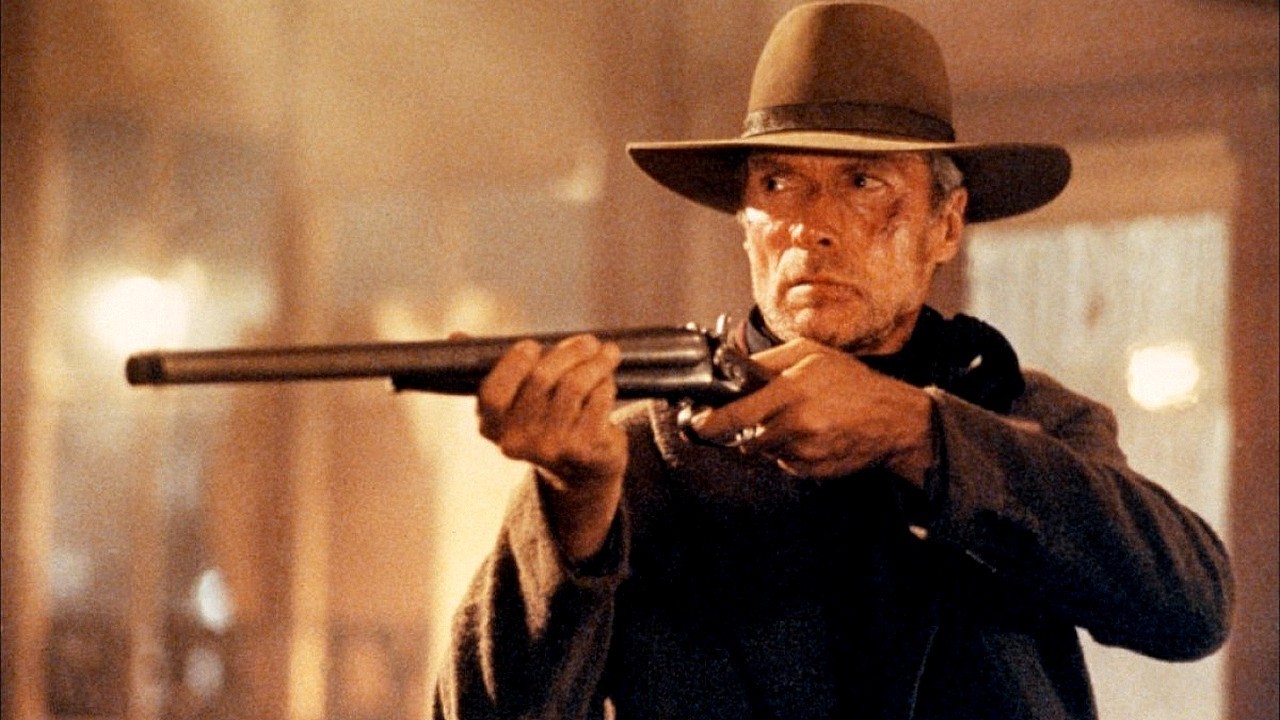
Could the love of another redeem you from your past sins? This is something that aging gunfighter William Munny (Eastwood) desperately wants to believe. In the cold dark of night, Munny and his friend Ned Logan (Morgan Freeman) are keeping warm by the fire. Munny confesses that he sometimes thinks back about an innocent man he shot and killed during a drunken stupor. Ned tells him that he used to be a crazy man, but now he’s different. Now, as Munny tells himself as Ned fades into sleep, ”I’m a fella just like everybody else.”
We never get to meet her, but it was Munny’s late wife who reformed him. She knew all about the things he’s done, yet she believed he could be a good man anyway. But now she’s not around anymore and Munny’s left alone with his memories. If she was still around, he wouldn’t have been here this late with Ned Logan, the man who’s all too acquainted with his dark side. They’re out on the hunt for a bounty on two cowboys who mutilated a prostitute. But as Munny states to Ned, ”just cos ’cause we’re goin’ on this killin’, that don’t mean I’m gonna go back to bein’ the way I was.” But in the end he becomes exactly the man he used to be: William Munny, killer of women and children.
“Unforgiven” is the deconstruction of the western myth; it takes place just as the modern world is closing in. Gunfighters have become legends, fodder for pulp-literature. English Bob (Richard Harris) is one of those retired gunfighters who is followed around by his own personal biographer, W.W. Beauchamp (Saul Rubinek). But his legend is mercilessly dismantled by Little Bill (Gene Hackman), who tells Beauchamp that one of Bob’s notorious stories was romanticized and that Bob’s involvement was far less noble.
These false stories reach the heart of a young man who calls himself The Schofield Kid (Jaimz Woolvett) and who joins Munny and Ned on their journey to collect the bounty. The Schofield kid is full of tall tales himself, saying he’s killed at least five men. But once he actually does kill a man in cold blood, he weeps and is filled with regret.
Then there is the violence in “Unforgiven.” Forget the quick draws of The Man with No Name. Here it’s all about luck and brutality. Just like in a real-life shootout, most people aren’t cool and collected. There’s clumsiness, they have no idea what they are doing, sometimes they just shoot wildly in the air with their eyes closed.
After the final shootout, Beauchamp asks Munny who he was aiming for first, whether he calculated his first shot. Munny just tells him that he was lucky, that he was always “lucky when it comes to killin’ folks.” And that’s all there is. Nothing glamorous. You better be lucky and savage to boot if you want to survive this world. Just before he gives Little Bill the killing shot, Bill is dumbfounded: ”I don’t deserve this, to die like this.” Munny coolly answers the most brutal truth of all when it comes to dying or being slain: ”Deserve’s got nothing to do with it.”
“Unforgiven” was dedicated to Don Siegel and Sergio Leone, two men who taught Eastwood everything he should know about filmmaking. Eastwood in turn not only made one of the greatest – if not THE greatest – westerns of all time, but one of the greatest films of all time. It would be the last time Eastwood would don the cowboy hat. But this gunslinger doesn’t ride into the sunset; instead he rides into the stormy night, stopping only to tell the townsfolk that they should never harm another whore again or else he will kill all of them.
As he makes this promise, we see the American flag hung against the saloon, billowing in the wind. The fearful townsfolk and the damaged prostitutes watch him disappear into the darkness. An epilogue states that Munny moved away with his kids, rumor being that he found success in San Francisco with dry goods. We wonder if he deserved such a fate, but as we’ve learned by the end of this film, deserve’s got nothing to do with it.
Author Bio: Chris van Dijk is a writer and a self-proclaimed cinematic-connoisseur who started his unhealthy obsession with film at a very young age. He’s famous for being an incredible slob, taking himself way too seriously and getting along brilliantly with anyone who agrees with him.